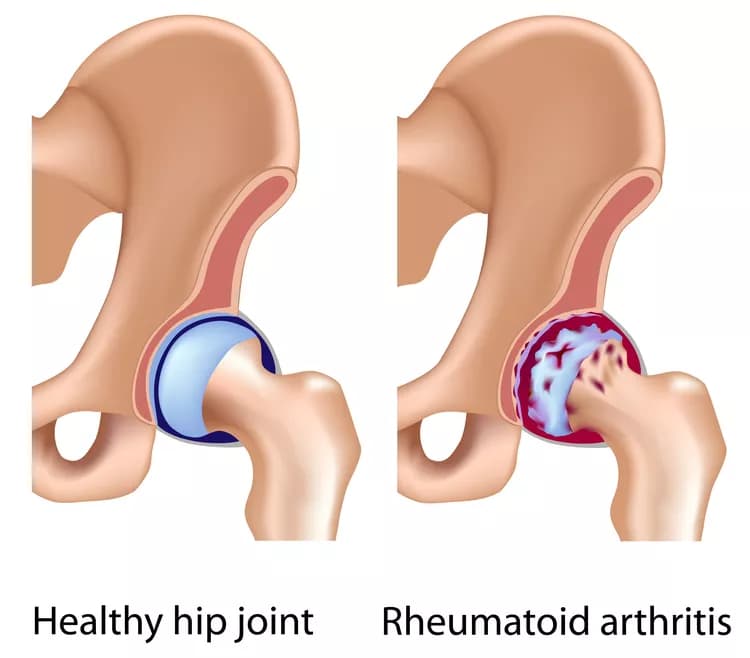
Studies Examine The Effects Of Weight On Patients With Rheumatoid Arthritis
New research provides insights on the potential effects of weight on the health of individuals with rheumatoid arthritis (RA). A study published in Arthritis Care & Research examines how overweight and obesity may affect the likelihood of achieving remission in early RA. A separate study in Arthritis & Rheumatology focuses on weight change in early RA and patients' subsequent risk of early death.
Research has suggested that weight may influence the effectiveness of RA therapies. In an Arthritis Care & Research study, Susan Goodman, MD, of the Hospital for Special Surgery and Weill Cornell Medical School, and her colleagues investigated the potential impact of weight on the likelihood that patients would achieve remission in the early years after an RA diagnosis. The team examined data from the Canadian Early Arthritis Cohort, a multicenter observational trial of patients with early RA who were treated by rheumatologists using guideline-based care.
"Our study looks at people with recently diagnosed, early RA, who should have the best outcomes and best responses to treatment, and sees how many are either overweight or obese, and then determines if those who are overweight or obese have worse outcomes than those with healthy weight," said Dr. Goodman.
Of 982 patients, 32 percent had a healthy BMI, 35 percent were overweight, and 33 percent were obese. Within three years, 36 percent of patients experienced sustained remission. Compared with patients with a healthy BMI, those who were overweight were 25 percent less likely to experience sustained remission, and those who were obese were 47 percent less likely to do so, despite receiving similar treatments.
The research represents the largest study demonstrating the negative impact of excess weight on the RA disease activity and supports a call to action to better identify and address this risk in patients.
"These findings have important implications for clinical care since rates of overweight and obesity continue to rise," said Dr. Goodman. "Our findings highlight the high proportion of newly diagnosed RA patients who are overweight or obese and who may have disease that is harder to treat. For people with RA who haven't had an adequate response to treatment, this may be another factor to consider."
In other studies, obesity has been associated with a decreased risk of early death; however, follow-up studies suggest that this "obesity paradox" may be explained by unintentional weight loss in the few years preceding death, rather than a truly protective effect of obesity. According to this explanation, patients with longstanding RA who reached normal or underweight BMI have higher observed mortality and are relatively less healthy than RA patients who maintained obesity or overweight.
To investigate the issue, Jeffrey Sparks, MD, MMSc, of Brigham and Women's Hospital and Harvard Medical School, and his colleagues evaluated the effect of weight change in the early stages of RA on subsequent mortality risk. Their Arthritis & Rheumatology study included 902 women diagnosed with RA in the Nurses' Health Study and 7884 matched women without RA.
Women with RA had higher mortality rates than women without RA. Among women with RA, 41 percent died during an average follow-up of 17.0 years after the early RA period; among women without RA, 29.2 percent died during an average follow-up of 18.4 years. In both groups, women who had severe weight loss (>30 pounds) had the highest mortality rates after the early RA period. Weight gain in the early RA period was not associated with mortality for either group.
"Our study is the first to focus on weight change around RA diagnosis and risk of death, rather than weight change in patients who had RA for many years, as in previous studies," said Dr. Sparks. "Our findings provide evidence that the results of earlier studies -- that patients who had normal weights were at higher risk of death -- may have been related to unintended weight loss as opposed to a protective effect of being overweight or obese. Our results demonstrate that these prior findings were less likely to be directly related to RA and were likely a phenomenon of frailty and aging of the general population."
Materials provided by Wiley. Note: Content may be edited for style and length.
Disclaimer: DoveMed is not responsible for the accuracy of the adapted version of news releases posted to DoveMed by contributing universities and institutions.
References:
Elizabeth Schulman, Susan J. Bartlett, Orit Schieir, Kathleen M. Andersen, Gilles Boire, Janet E. Pope, Carol Hitchon, Shahin Jamal, Carter J. Thorne, Diane Tin, Edward C. Keystone, Boulos Haraoui, Susan M Goodman, Vivian P. Bykerk, CATCH Investigators. (2017). Overweight and Obesity Reduce the Likelihood of Achieving Sustained Remission in Early Rheumatoid Arthritis: Results from the Canadian Early Arthritis Cohort Study. Arthritis Care & Research. DOI: 10.1002/acr.23457
Related Articles
Test Your Knowledge
Asked by users
Related Centers
Related Specialties
Related Physicians
Related Procedures
Related Resources
Join DoveHubs
and connect with fellow professionals

0 Comments
Please log in to post a comment.